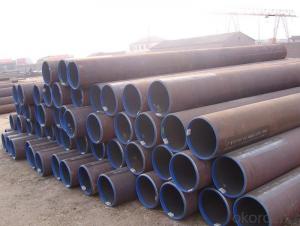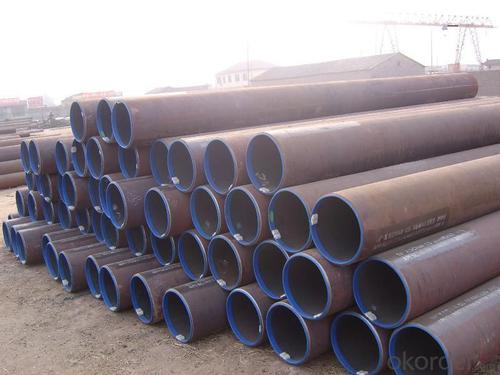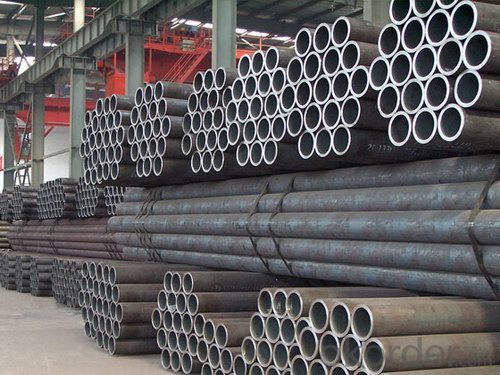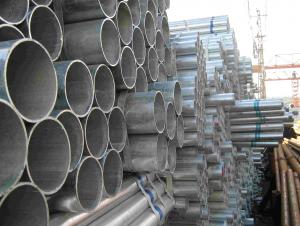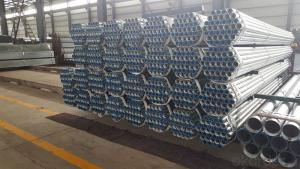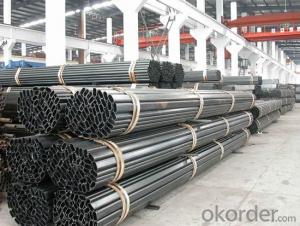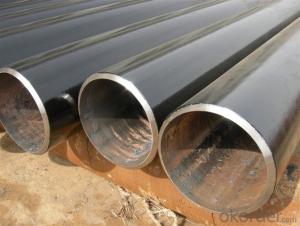Tube Pipe -The Welded Steel Pipe Production
- Loading Port:
- Tianjin
- Payment Terms:
- TT OR LC
- Min Order Qty:
- 25 m.t.
- Supply Capability:
- 7000 m.t./month
OKorder Service Pledge
OKorder Financial Service
You Might Also Like
1、Structure of Welded Steel Pipe DIN1829/EN10216-1:
Welded Steel Pipe is to be used for conveying gas, water, and petroleum foroil and natural gas industries. And used for structural steel pies purpose. We can produce any pipe and tube, and in order to meet client's demand, our engineer team is trying to do more professional.
2、Main Features of Welded Steel Pipe DIN1829/EN10216-1:
• High manufacturing accuracy
• High strength
• Small inertia resistance
• Strong heat dissipation ability
• Good visual effect
• Reasonable price
3、Welded Steel Pipe DIN1829/EN10216-1: Specification:
Standard | GB, DIN, ASTM ASTM A106-2006, ASTM A53-2007 |
Grade | 10#-45#, 16Mn 10#, 20#, 45#, 16Mn |
Thickness | 8 - 33 mm |
Section Shape | Round |
Outer Diameter | 133 - 219 mm |
Place of Origin | Shandong, China (Mainland) |
Secondary Or Not | Non-secondary |
Application | Hydraulic Pipe |
Technique | Cold Drawn |
Certification | API |
Surface Treatment | factory state or painted black |
Special Pipe | API Pipe |
Alloy Or Not | Non-alloy |
Length | 5-12M |
Outer Diameter | 21.3-610mm |
Grade | 20#, 45#, Q345, API J55, API K55, API L80, API N80, API P110, A53B |
Standard | ASME, ASTM |
1) Material:20#(ASTM A 106/A53 GRB.API5LGRB,GB),45#,16Mn,10#.
2) Specification range:OD:21.3-610mm,WT:6-70mm,length:6-12m or according to the requirement of clients.
3) Excutive standards:GB,ASME API5L.ASTM A 106/A53,Despite of the above standards,we can also supply seamless steel pipe with standard of DIN,JIS,and so on,and also develop new products according to the requirements of our clients!
4) Surface:black lacquered,varnish coating or galvanized.
5) Ends:Beveled or square cut,plastic capped,painted.
6) Packing:bundles wrapped with strong steel strip,seaworthy packing.
4、Packaging & Delivery
Packaging Details: | seaworthy package,bundles wrapped with strong steel strip |
Delivery Detail: | 15-30days after received 30%TT |
5、FAQ of Welded Steel Pipe DIN1829/EN10216-1:
①How is the quality of your products?
Our products are manufactured strictly according to national and internaional standard, and we take a test
on every pipe before delivered out. If you want see our quality certifications and all kinds of testing report, please just ask us for it.
Guaranteed: If products’ quality don’t accord to discription as we give or the promise before you place order, we promise 100% refund.
②How about price?
Yes, we are factory and be able to give you lowest price below market one, and we have a policy that “ for saving time and absolutely honest business attitude, we quote as lowest as possible for any customer, and discount can be given according to quantity”,if you like bargain and factory price is not low enough as you think, just don’t waste your time.Please trust the quotation we would give you, it is professional one.
③Why should you chose us?
Chose happens because of quality, then price, We can give you both.Additionally, we can also offer professional products inquiry, products knowledge train(for agents), we have professional manager team and engineer team and sales team, and we are keep in studying and find better way or a new way to produce high quality production.
6、 Welded Steel Pipe DIN1629/EN10216-1: Images:
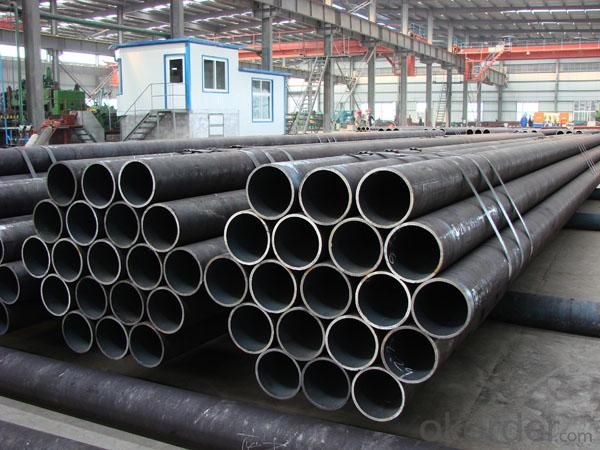
- Q: What are the different types of steel pipe fittings for industrial applications?
- There are several types of steel pipe fittings commonly used in industrial applications, including elbows, tees, reducers, couplings, unions, flanges, and caps. These fittings are designed to connect, redirect, or control the flow of fluids in a piping system, ensuring efficient and reliable operation in various industrial processes.
- Q: How are steel pipes used in power plants?
- Power plants rely heavily on the extensive use of steel pipes for a variety of purposes. When it comes to transporting fluids and gases, steel pipes are the go-to choice. They effectively carry water, steam, and fuel (like oil or gas) throughout the power plant. The reason steel pipes are so widely used for this purpose is because of their exceptional strength and durability. They can withstand the high pressures and temperatures found in power plants without faltering. Another crucial role steel pipes play in power plants is in the boilers. They are an integral part of the boiler system, responsible for the transportation of hot gases and steam. These pipes are specifically designed to endure extreme heat and pressure, ensuring the safe and efficient operation of the boiler. Moreover, steel pipes are utilized in the cooling systems of power plants. They facilitate the circulation of water to cool down essential equipment such as turbines and condensers. These pipes are built to withstand corrosion caused by the cooling water, all while maintaining the required flow rate and pressure. Additionally, steel pipes find their place in the construction of power plant structures. They are extensively used for fabricating support structures like frames, platforms, and walkways. Steel pipes possess excellent structural integrity and can bear heavy loads, making them the perfect choice for these applications. In conclusion, steel pipes fulfill a crucial role in power plants by efficiently transporting fluids and gases, serving as an essential component of the boiler system, facilitating cooling processes, and providing structural support. Their strength, durability, and resistance to extreme conditions make them indispensable in the operation of power plants.
- Q: Are steel pipes suitable for wastewater treatment plants?
- Yes, steel pipes are suitable for wastewater treatment plants. Steel pipes are known for their durability, corrosion resistance, and high strength, making them ideal for handling the demanding conditions of wastewater treatment plants. They can effectively transport and contain wastewater without any structural or functional issues, ensuring efficient and reliable operation of the treatment process.
- Q: Can steel pipes be used for sewage and wastewater systems?
- Yes, steel pipes can be used for sewage and wastewater systems. Steel pipes are durable, strong, and resistant to corrosion, making them suitable for transporting sewage and wastewater. They are commonly used in various industrial and municipal applications due to their ability to withstand high pressure and provide long-lasting performance.
- Q: How are steel pipes used in the construction of stadiums and arenas?
- Steel pipes are commonly used in the construction of stadiums and arenas for various purposes. They are primarily used for the structural framework, supporting the weight of the building and providing stability. Steel pipes are also used for the installation of HVAC systems, electrical wiring, and plumbing, allowing for efficient distribution of utilities throughout the facility. Additionally, steel pipes are utilized for the construction of handrails, fences, and barriers, ensuring safety and security for spectators.
- Q: How are steel pipes stored and transported?
- To ensure the safety and prevent damage of steel pipes, a systematic and efficient approach is employed for their storage and transportation. In terms of storage, designated areas are used to either horizontally or vertically stack the pipes. In the case of vertical stacking, custom-made racks or stands are utilized to provide support and prevent rolling or collapsing. This method not only saves space but also allows for easy accessibility when required. To safeguard steel pipes against corrosion and environmental elements, a layer of paint or other protective materials is often applied. Furthermore, pipes may be stored indoors in warehouses or storage facilities to shield them from unfavorable weather conditions. In terms of transportation, depending on the distance and destination, steel pipes are typically loaded onto trucks, railcars, or ships. Specialized equipment such as cranes or forklifts is employed to handle and load the pipes onto these vehicles. To prevent movement during transit, the pipes are tightly secured using straps, chains, or braces. This ensures stability and eliminates the risk of damage to the pipes themselves or other cargo. For long-distance transportation, steel pipes are often transported in bundles or stacks, reinforced to provide additional security. They may also be packed in protective coverings or containers to shield them from moisture, dust, or impacts. Overall, the storage and transportation of steel pipes necessitate meticulous planning, proper handling, and appropriate protective measures to uphold their integrity and quality throughout the entire process.
- Q: What are the different grades of steel used in manufacturing pipes?
- There are several grades of steel used in manufacturing pipes, including carbon steel, alloy steel, stainless steel, and duplex steel. Each grade has distinct properties and characteristics that make it suitable for different applications and environments.
- Q: What are the different types of supports used for steel pipes?
- The different types of supports used for steel pipes include pipe hangers, clamps, brackets, and anchors. Pipe hangers are used to suspend the pipe from a structure, while clamps provide support and prevent movement. Brackets are used to secure the pipe to a wall or other surface, and anchors are used to prevent the pipe from shifting or moving. These supports help to ensure the stability and proper installation of steel pipes.
- Q: How are steel pipes connected in pipeline construction?
- Steel pipes are connected in pipeline construction through various methods, such as welding, threading, and flanges. Welding involves melting the ends of two pipes together to form a strong and permanent bond. Threading involves cutting grooves into the ends of pipes, which are then screwed together using threaded fittings. Flanges are used to connect pipes by bolting them together, creating a secure and leak-proof connection. These connection methods ensure the integrity and durability of the pipeline system.
- Q: What is the impact resistance of steel pipes?
- Steel pipes have a high level of impact resistance thanks to the natural properties of steel. Steel, known for its strength and durability, can endure substantial external forces and impacts without deforming or breaking. The impact resistance of steel pipes is further improved by their construction and design. Various manufacturing techniques, such as seamless or welded construction, are used to create steel pipes, ensuring uniformity and strength throughout the structure. This construction process eliminates weak points or seams that could compromise the pipe's impact resistance. Additionally, steel pipes can be customized to meet specific impact resistance requirements based on their intended use. Different grades and types of steel can be utilized to achieve varying levels of impact resistance, allowing for customization to suit different industries and environments. The excellent impact resistance of steel pipes is particularly advantageous in industries such as construction, oil and gas, and transportation. These industries subject pipes to heavy loads, pressure, and potential impacts. Steel pipes can withstand these harsh conditions, making them a dependable choice for a wide range of applications. To summarize, steel pipes have outstanding impact resistance due to the inherent strength and durability of steel, as well as the construction techniques employed during manufacturing. Steel pipes can withstand significant external forces and impacts, making them a reliable and sturdy option for various industries and applications.
Send your message to us
Tube Pipe -The Welded Steel Pipe Production
- Loading Port:
- Tianjin
- Payment Terms:
- TT OR LC
- Min Order Qty:
- 25 m.t.
- Supply Capability:
- 7000 m.t./month
OKorder Service Pledge
OKorder Financial Service
Similar products
Hot products
Hot Searches
Related keywords
